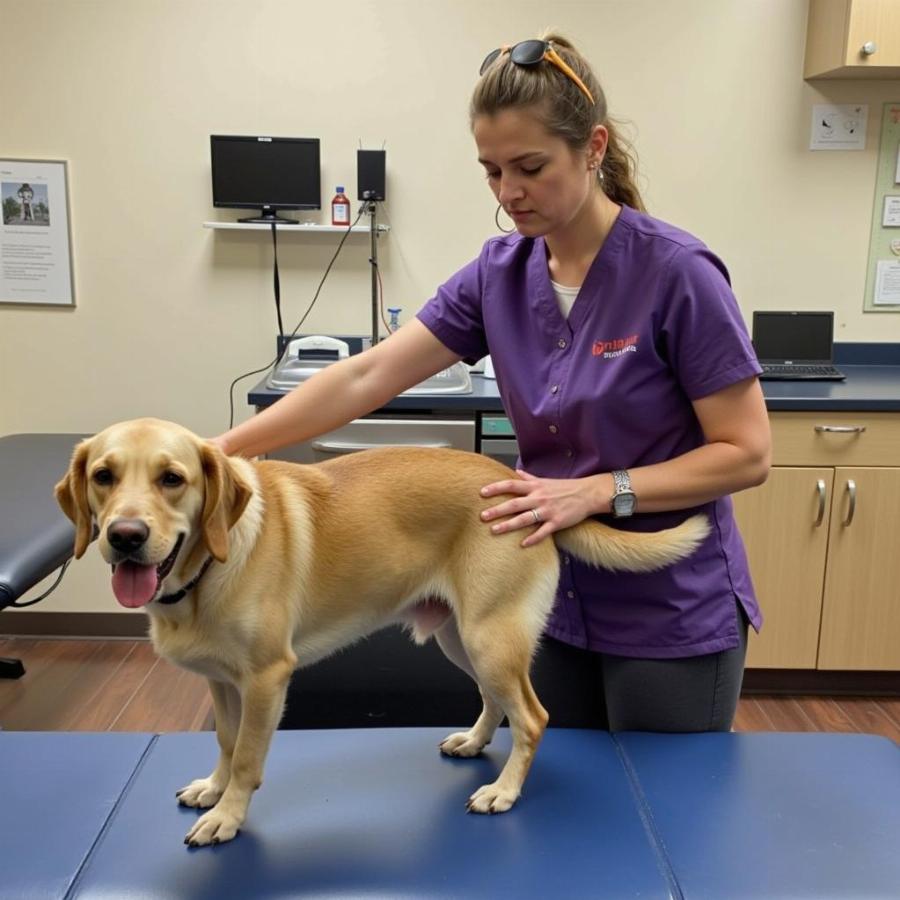A torn ACL (anterior cruciate ligament) is a common and painful injury for dogs, often leading to lameness and decreased mobility. Understanding dog ACL tear surgery, including the different surgical options, recovery process, and potential complications, is crucial for any pet owner facing this challenging situation. This guide provides a comprehensive overview of everything you need to to know about dog ACL tear surgery to help your furry friend regain their active lifestyle.
Understanding the ACL Injury in Dogs
The ACL is a crucial ligament in a dog’s knee, providing stability and allowing for normal movement. When this ligament tears, partially or completely, it can cause significant pain and instability in the joint. This often leads to limping, especially after exercise, and difficulty bearing weight on the affected leg. While some small dogs might seem to recover with rest, the instability often persists, leading to further joint damage over time. For larger dogs, surgery is almost always necessary to restore normal function.
Dog ACL Tear Surgery Options
There are several surgical options available for repairing a torn ACL in dogs. The most common procedures include:
- TPLO (Tibial Plateau Leveling Osteotomy): This procedure involves cutting and rotating the top portion of the tibia (shinbone) to change the angle of the tibial plateau, reducing the need for the ACL.
- TTA (Tibial Tuberosity Advancement): This technique involves advancing the tibial tuberosity, the point where the patellar tendon attaches to the tibia, creating a dynamic force that stabilizes the knee.
- Extracapsular Repair: This method involves placing a suture outside the joint capsule to mimic the function of the ACL. This is generally recommended for smaller dogs.
- Lateral Suture Stabilization: Similar to extracapsular repair, this involves placing sutures to stabilize the joint.
Choosing the best surgical option for your dog depends on factors like their size, breed, activity level, and overall health. Your veterinarian will discuss the pros and cons of each procedure to help you make the right decision. acl surgery on a dog provides more details on the different types of surgeries.
What to Expect During and After ACL Surgery
Before the surgery, your veterinarian will perform a thorough examination and may recommend blood tests and X-rays to assess your dog’s overall health and the extent of the injury. The surgery itself is performed under general anesthesia. After the surgery, your dog will require several weeks of restricted activity and pain medication.
Recovery and Rehabilitation
Rehabilitation is a critical part of the recovery process after dog ACL tear surgery. This typically involves a combination of rest, controlled exercise, and physical therapy. ccl brace for dogs can be helpful during the recovery period. Your veterinarian will provide you with a detailed recovery plan, including instructions on how to manage your dog’s pain and gradually increase their activity level. Following the rehabilitation plan closely is essential for ensuring a successful recovery and preventing re-injury.
Potential Complications and Long-Term Outlook
While dog ACL tear surgery is generally safe and effective, potential complications can include infection, swelling, implant failure, and re-injury. knee surgery for dogs goes deeper into the details of this procedure. It’s crucial to monitor your dog closely for any signs of complications and contact your veterinarian immediately if you notice anything unusual. With proper care and rehabilitation, most dogs regain normal function and enjoy an active lifestyle after ACL surgery. braces for dogs acl can provide long-term support.
 Dog Undergoing Physical Therapy After ACL Surgery
Dog Undergoing Physical Therapy After ACL Surgery
Conclusion
Dog ACL tear surgery is a significant procedure, but it’s often necessary to restore a dog’s mobility and prevent long-term joint damage. Understanding the different surgical options, the recovery process, and potential complications can help you make informed decisions and provide the best possible care for your furry friend. cost of acl surgery for dog can help you plan for this procedure. Early diagnosis and intervention are key to a successful outcome, so if you suspect your dog has a torn ACL, consult with your veterinarian as soon as possible.
FAQ
-
How can I tell if my dog has torn its ACL? Limping, especially after exercise, swelling in the knee joint, and difficulty bearing weight on the affected leg are common signs.
-
How long is the recovery period after dog ACL tear surgery? Recovery typically takes several months, with restricted activity for the first few weeks followed by gradual rehabilitation.
-
What is the success rate of dog ACL tear surgery? The success rate is generally high, with most dogs regaining normal function after surgery and rehabilitation.
-
What are the alternatives to surgery for a torn ACL in dogs? Conservative management, including rest, pain medication, and bracing, may be an option for some small dogs, but surgery is often necessary for larger breeds.
-
How much does dog ACL tear surgery cost? The cost can vary depending on the surgical technique, the veterinarian, and your geographic location.
-
Is there a way to prevent ACL tears in dogs? Maintaining a healthy weight, providing regular exercise, and avoiding high-impact activities can help reduce the risk of ACL tears.
-
What kind of physical therapy is recommended after ACL surgery? Physical therapy may include range of motion exercises, strengthening exercises, and hydrotherapy.
Further Reading and Related Topics
- Canine Arthritis Management
- Post-Surgical Care for Dogs
- Choosing the Right Dog Food for Joint Health
Beaut Dogs is your trusted source for all things related to dog care, offering expert advice and valuable information to help you keep your furry companion happy and healthy. From breed-specific information to health guides and product recommendations, Beaut Dogs is your one-stop shop for everything dog-related. When you need expert assistance, don’t hesitate to contact us via Email at [email protected]. We’re here to provide you with accurate and detailed answers to all your dog-related questions. Visit us today at https://beautdogs.com!